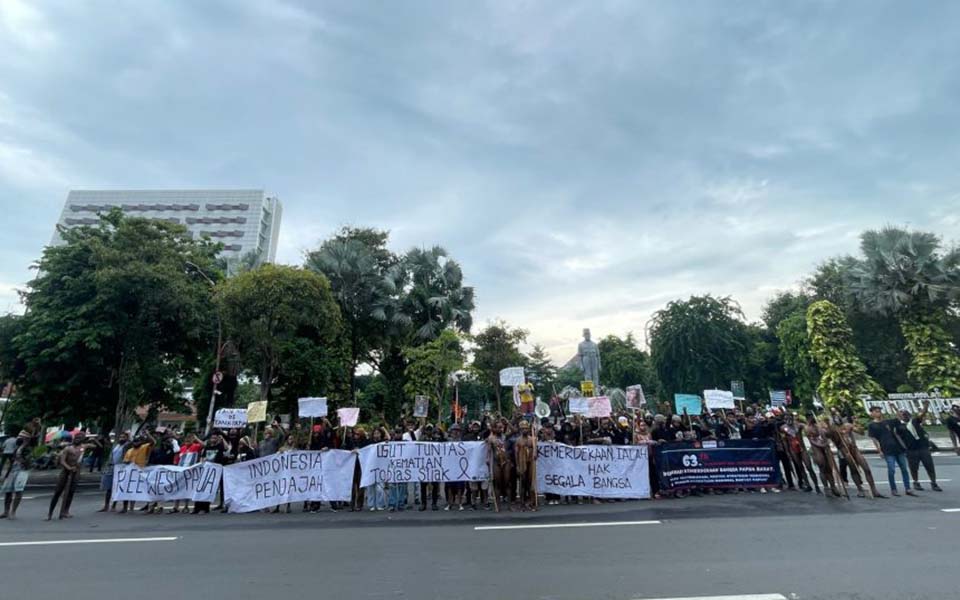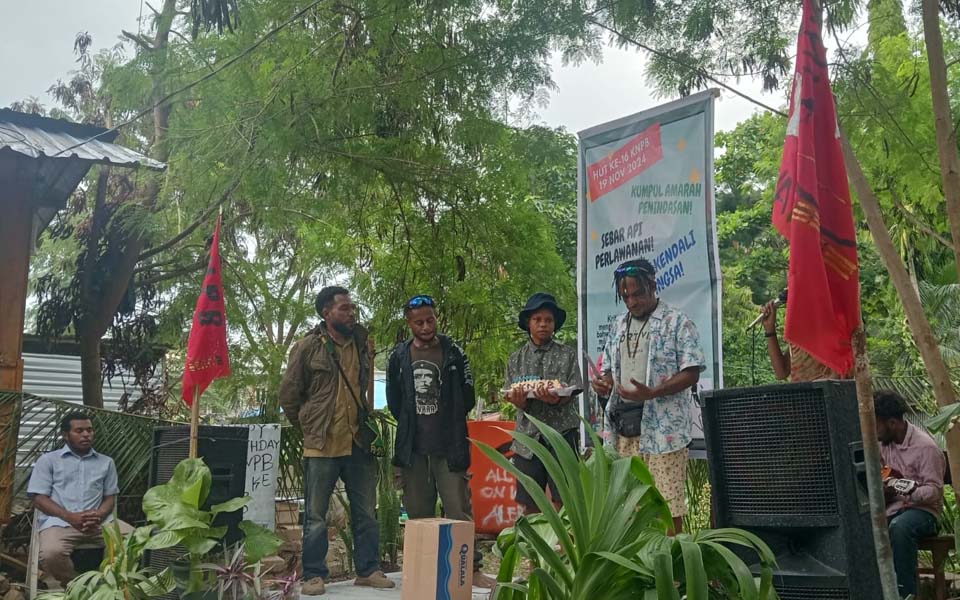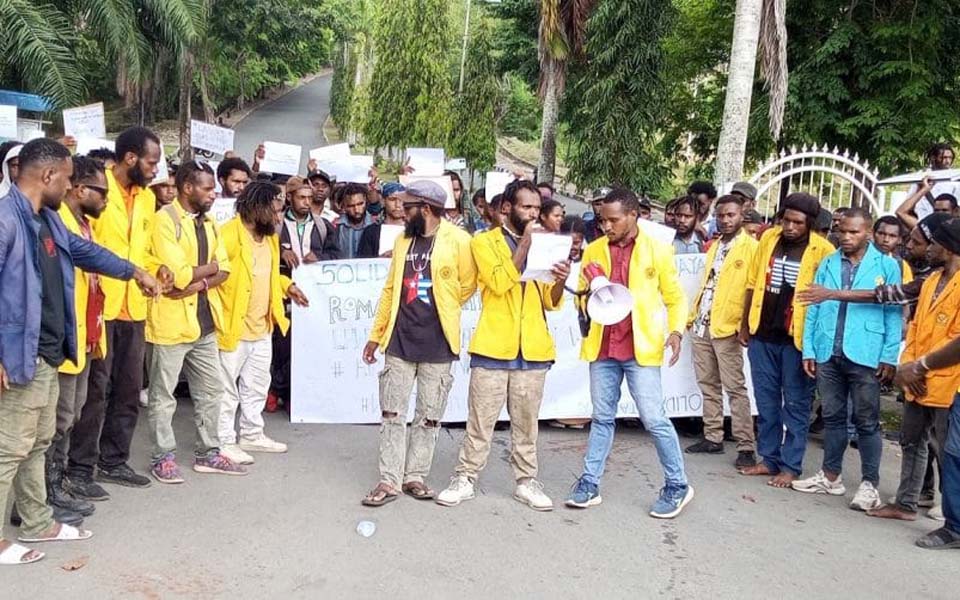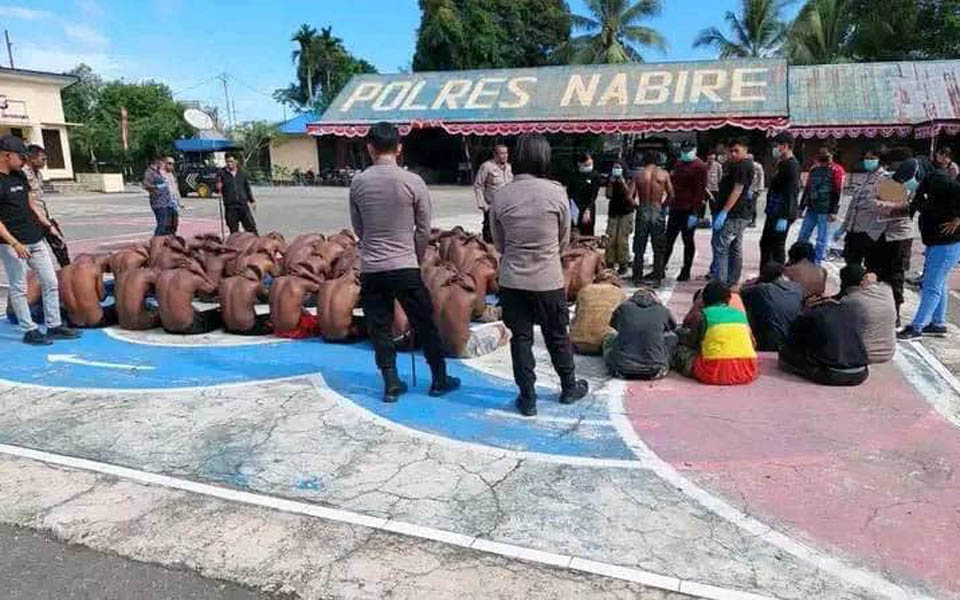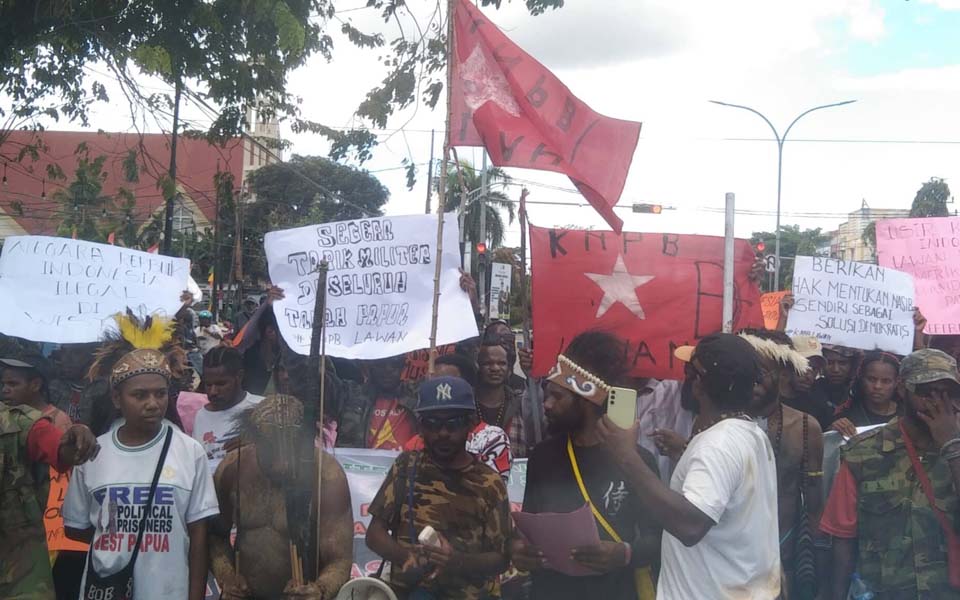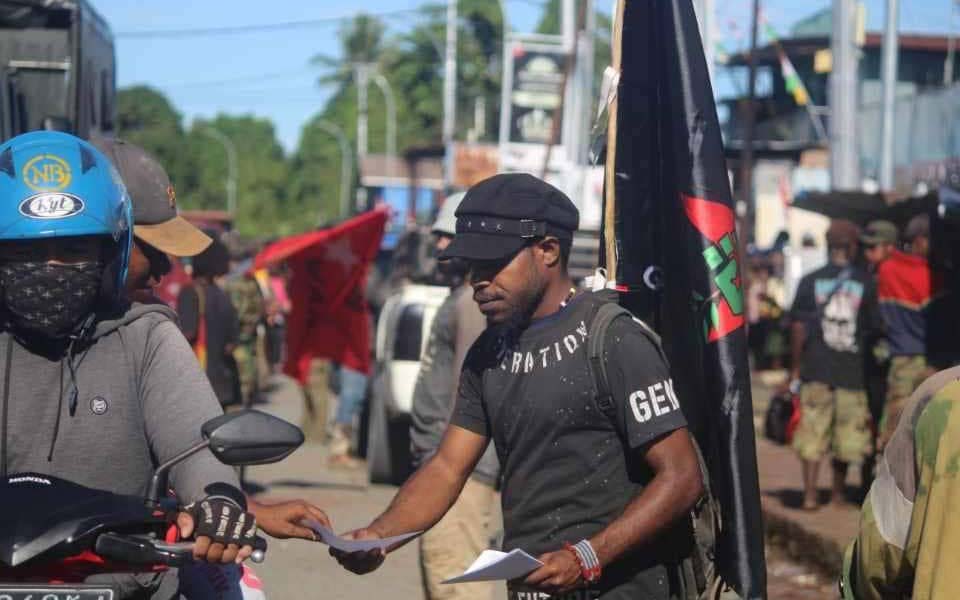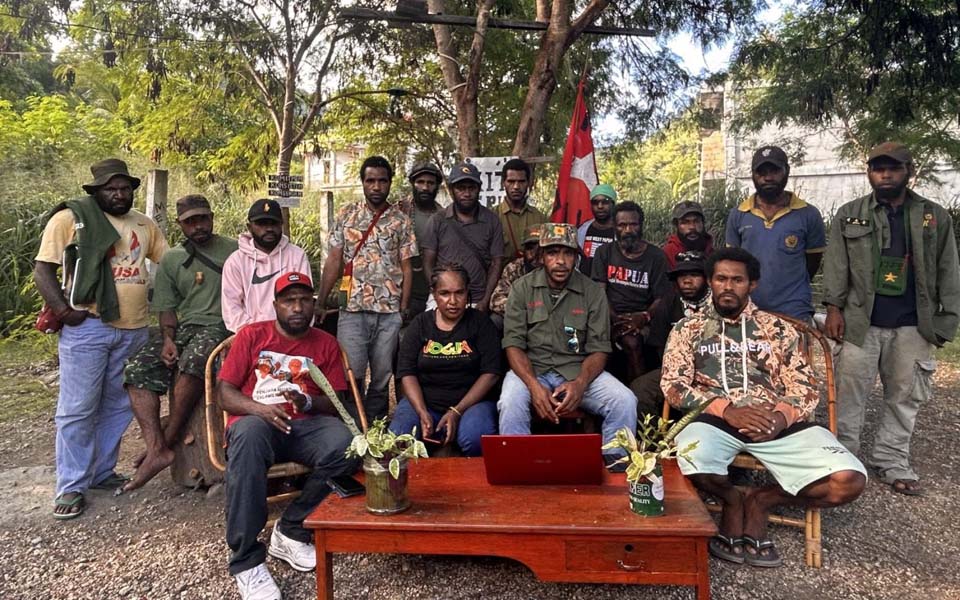Kustin Ayuwuragil & Ramadhan Rizki, Jakarta – Commemorating 49 years since the ‘Act of Free Choice’ (Pepera), the Papuan Student Alliance (AMP) and the Indonesian People’s Front for West Papua (FRI-WP) held protest actions in 13 cities across Indonesia including Jakarta, Bandung and Ambon.
AMP spokesperson Surya Anta said that they were taking to the streets based on two principal issues related to West Papuan independence.
“They already declared their independence in 1961 deciding not to be part of the 1945 [declaration of Indonesian] independence [from the Dutch]”, Surya told CNN Indonesia in front of the State Palace in Central Jakarta on Thursday August 2.
Surya explained that at the time, the people of West Papua already had a state symbol, flag and currency, although no administration had yet been established.
The second reason meanwhile is that the people of West Papua want to separate from Indonesia because for years and years they have suffered slow-motion genocide.
This is in no way in accordance with the values enshrined in the state ideology of Pancasila in realising independence for all nations.
“They suffer oppression, abuse, slow-motion genocide, rape, abductions, no freedom of expression and access to information, and many other things”, he continued.
The problems facing the West Papuans also include the massive exploitation of natural resources, which according to Surya, is because of the PT Freeport Indonesian gold-and-copper mine problem. Social inequality is also high compared with other parts of Indonesia.
Surya added that the West Papuan people want to separate from Indonesia because they do not feel Indonesian because of the numerous problems mentioned earlier.
“Yes (they want to separate from Indonesia) because from the very beginning they did not feel Indonesian. Go ahead and check the [1948] Youth Pledge. Was West Papua mentioned there?”, he said.
Furthermore, Surya said that the infrastructure develo0ment which is being touted by President Joko “Jokowi” Widodo in Papua has not been enough to make the people feel Indonesian.
“Yeah, like the Dutch [colonial] period, we got schools, but did this then make us become Dutch citizens? No. We still felt convinced that our identity was different”, he answered.
Widodo has become known as the Indonesian president which has most often visited Papua. His agenda has been varied but in his Nawa Cita [nine point priority program], Widodo prioritised the resolution of past human rights violations and the development of infrastructure in Papua.
Same old song
Coordinating Minister for Security, Politics and Legal Affairs (Menko Polhukam) Wiranto referred to protests by Papuan pro-independence activists such as today’s as being a separatist action seeking to attract international attention.
“It’s a small separatist movement but by methods such as this [they] want to get world attention”, said Wiranto at his office in Jakarta.
The former commander of ABRI (Indonesian Armed Forces, now TNI) said that threats by Papuan pro-independence groups which have been widespread of late are just the “same old song” which has been played repeatedly for a long time.
As has been reported, the United Liberation Movement for West Papua (ULMWP) will be holding actions in Jakarta and London to support a new referendum for the Papuan people.
Not only that, at today’s action in front of the State Palace the AMP and the FRI-WP expressed their support for West Papuan liberation from the NKRI or Unitary State of the Republic of Indonesia.
Responding to this, Wiranto suggested that people do not need to become upset or anxious about the frequent actions by such groups.
“This old song is the same as the one played in the past, we don’t need to get upset, we don’t need to get anxious, we will just fight it”, he said.
Wiranto also said that the government would not be influenced by the separatist threat from such groups.
He asserted that in principle the government still considers Papua will remain part of the NKRI forever and does not need to be disturbed by challenges by any party at all.
“It is clear that we have a principle and standing position which cannot be disrupted by challenges from movements such as this”, he said.
Soft diplomacy
In addition to this, Wiranto also insisted that the government has repeatedly made efforts to develop diplomatic relations with neighbouring countries in order to suppress biased issues related to development in Papua.
Wiranto claimed that heads of state in the Asia-Pacific region such as Micronesia, Nauru, and Australia are often invited to help in suppressing such groups.
“Soft diplomacy activities which we are carrying out in the South Pacific continue apace. They [the Papuan separatist groups] perhaps then feel angry about the soft diplomacy activities that we are conducting”, said Wiranto.
Not only that, Wiranto claimed to have invited officials from these countries to see for themselves the current conditions and social developments in remote parts of Papua.
This is aimed at preventing countries in the Asia-Pacific region from misunderstanding the current social developments and situation in Papua.
“So we invite them to see the facts [on the ground]. As if we do not provide good education to our friends in Papua. This issue is being continually pushed, continually made an issue of, in Europe, the South Pacific, but you know yourself right, the reality is not like that”, he said.
Wiranto said that there are still potential threats from irresponsible parties which results in the emergence of separatist groups in Papua.
He was reluctant however to city which parties he means. Wiranto said only that these parties do not want Indonesian to be united and only want to take the profits from mining in Papua.
“Because there are still parties that do not want our country to be united, there are still parties which take the profits from mining activities”, he said. (osc)
Notes
- Pepera – Known as the “Act of Free Choice”, in 1969 a referendum was held to decide whether West Papua, a former Dutch colony annexed by Indonesia in 1963, would be become independent or join Indonesia. The UN sanction plebiscite, in which 1,025 hand-picked tribal leaders allegedly expressed their desire for integration, has been widely dismissed as a sham. Critics claim that that the selected voters were coerced, threatened and closely scrutinized by the military to unanimously vote for integration.
- Although it is widely held that West Papua declared independence from Indonesia on December 1, 1961, this actually marks the date when the Morning Star (Bintang Kejora) flag was first raised alongside the Dutch flag in an officially sanctioned ceremony in Jayapura, then called Hollandia. The first declaration of independence actually took place on July 1, 1971 at the Victoria Headquarters in Waris Village, Jayapura, when Oom Nicolas Jouwe and two Free Papua Organisation (OPM) commanders, Seth (sometimes spelt Zeth) Jafeth Roemkorem and Jacob Hendrik Prai, raised the Morning Star flag and unilaterally proclaimed Papua Barat or West Papua as an independent democratic republic, complete with a National Liberation Army (TPN), a provisional constitution, government, senate and parliament.
[Translated by James Balowski. The original title of the article was Aksi Referendum Papua: Infrastruktur Jokowi Bukan Jawaban.]






